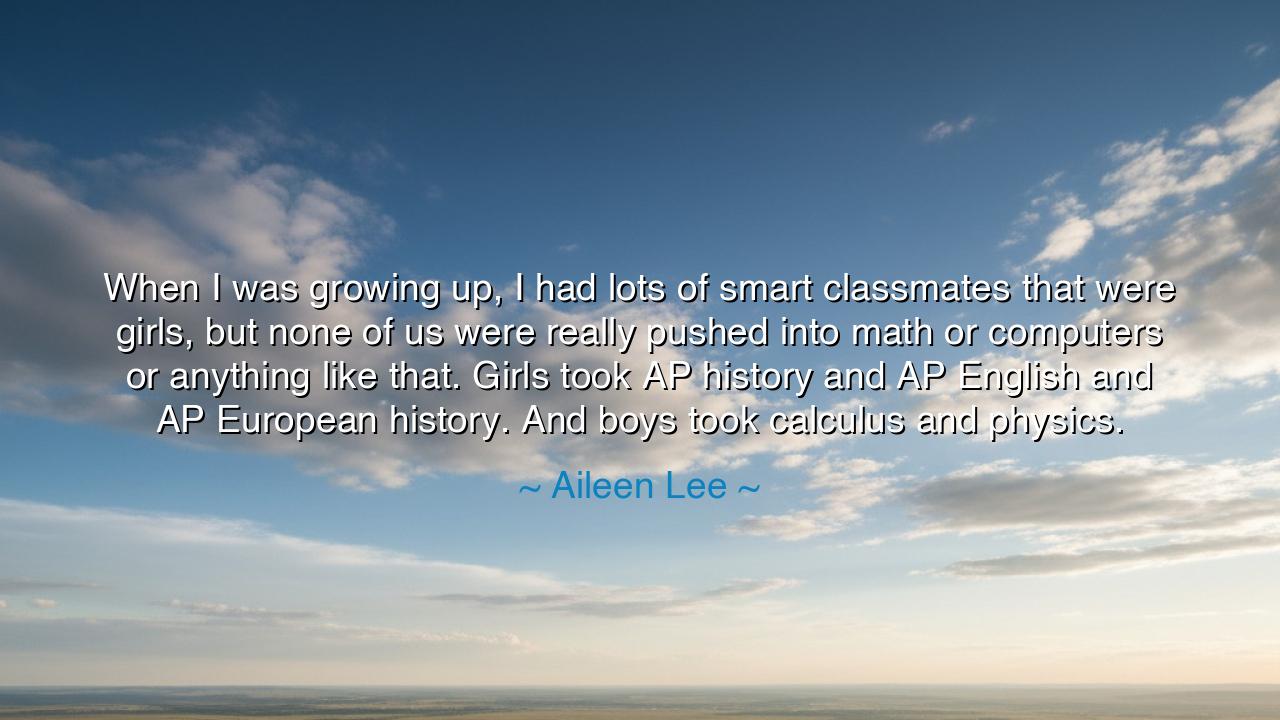
When I was growing up, I had lots of smart classmates that were
When I was growing up, I had lots of smart classmates that were girls, but none of us were really pushed into math or computers or anything like that. Girls took AP history and AP English and AP European history. And boys took calculus and physics.






The wise entrepreneur and visionary Aileen Lee once spoke words that cut through the silence of generations: “When I was growing up, I had lots of smart classmates that were girls, but none of us were really pushed into math or computers or anything like that. Girls took AP history and AP English and AP European history. And boys took calculus and physics.” In this reflection, she does not speak merely of her youth, but of a quiet and ancient imbalance—the invisible barriers woven into culture that shape destiny before it even begins. Her words echo through time as both lament and awakening, calling us to remember that potential left unguided is potential lost, and that talent without encouragement is like a seed left unwatered in the dark.
In the ancient days, the great teachers of Greece, India, and China taught that wisdom knows no gender. The soul, they said, is neither male nor female—it is pure intellect, pure flame, pure spirit. And yet, through the centuries, societies built walls where none should stand. They divided the paths of knowledge: one for men, marked by science and discovery; another for women, lined with words and service. Aileen Lee, in recalling her school days, shows us that this division, though unspoken, still lingers in modern times. The girls, bright and eager, were guided toward the humanities, while the boys, no wiser by birth, were pushed toward the realms of mathematics and invention. Thus, the map of opportunity was drawn, not by ability, but by expectation.
This quiet division has shaped the very world we live in. How many inventions were never born because a young woman, brilliant in reason, was told that numbers were not her domain? How many discoveries were delayed because half of humanity was not invited to the table of innovation? In the story of Ada Lovelace, daughter of the poet Lord Byron, we find the rare exception—a woman who refused to accept such limits. She studied the language of machines in an age when women were not meant to study at all. It was she who first saw that a computer could be more than a calculating tool—it could create music, art, and language. Yet for more than a century, her name was forgotten while men built empires upon her vision. In this, we see not just a story of one woman, but of countless unseen minds whose brilliance was dimmed by culture’s narrow lens.
Aileen Lee’s words are therefore not nostalgia—they are testimony. She speaks for every young girl who sat in a classroom, her hand raised, but was told by silence that she did not belong in the world of circuits and equations. This is the heritage of bias: it does not shout, but whispers; it does not forbid, but fails to invite. Yet from those whispers arise generations of women who question, who strive, who begin to rebuild the world anew. The rising voices of women in STEM—science, technology, engineering, and mathematics—are not a rebellion against men, but a restoration of balance long denied.
The ancients taught that balance is the foundation of harmony. When one half of the world’s wisdom is silenced, the whole world falters. The human mind—whether born in a boy or a girl—is a universe capable of wonder beyond measure. To deny its growth is to dim the stars themselves. Thus, Lee’s reflection is not merely about education, but about the shaping of civilization. For if the world continues to assign dreams by gender, it shall never know the full height of its own potential.
Consider the story of Hypatia of Alexandria, the philosopher and mathematician who taught men and women alike in the great Library of Alexandria. She lived in a time when the idea of a woman teaching science was heresy, yet she refused to yield. She spoke of the stars, of numbers, of the music that moves the spheres. And though her life ended in tragedy, her courage lit a beacon that has not yet gone out. Aileen Lee’s message is of that same lineage—a call to rekindle the ancient truth that wisdom is not the inheritance of one gender but the birthright of all humankind.
So let the lesson be this: encouragement is the soil of greatness. Parents, teachers, and leaders—speak not of what boys and girls “should” do, but of what each heart burns to pursue. Do not let culture write the destiny of your daughters or your sons. Let curiosity be the compass, and let opportunity know no walls. For in every child, there is a spark of genius waiting for the breath of belief. When we nurture that spark without bias, we honor not only Aileen Lee’s truth, but the timeless law of harmony—that every voice, when free to rise, strengthens the song of the world.
And so, to future generations, let these words be remembered: the divisions of the past must not define the possibilities of the future. Whether through numbers or words, through computers or poetry, through invention or art, the mind that is encouraged will always find its path to greatness. Let us be the generation that breaks the quiet chain, that opens every door, and that teaches every child—girl or boy—that knowledge belongs to all who dare to seek it.






AAdministratorAdministrator
Welcome, honored guests. Please leave a comment, we will respond soon